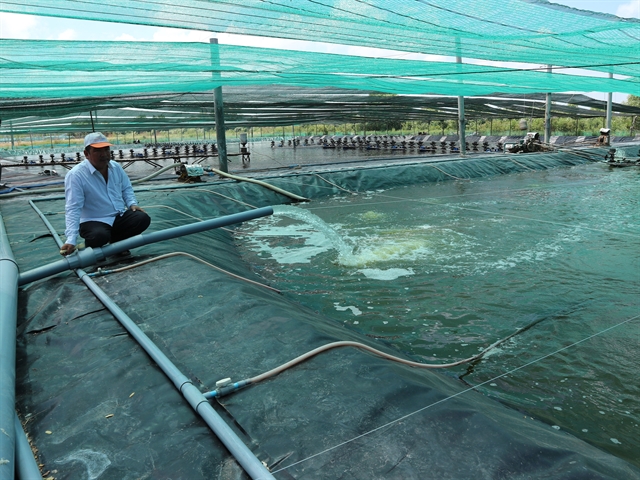 Economy
Economy


|
| A super-intensive shrimp farm. Super-intensive farms yield higher output but their wastewater is still a big headache for many local authorities. VNA/VNS Photo |
HÀ NỘI — The fishery industry has begun to shift from a catch-based to a farm-based mindset, and it needs support from associations to accelerate the transition, according to the Deputy Minister of Agriculture and Rural Development Phùng Đức Tiến.
Tiến made the remarks at a recent meeting with eight fishery associations, saying the industry is growing by roughly 6 per cent annually. However, the growth is expected to slow down sooner or later as a result of diminishing marginal productivity.
To keep the marginal productivity unabated, the industry has to transform itself into a large-scale industry that is deeply involved in global supply chains and comprised of well-known trademarks.
The deputy minister urged relevant ministries and associations to cooperate to speed up the market-oriented industrialisation and modernisation of the industry, preserve its fishery resources and biodiversity, maintain its biosafety and biosecurity, and improve its adaptability to climate change.
Additionally, he urged the industry to further enhance people's living standards and engage in the new-style rural area programme. He also called for more infrastructure investments, more education and training programmes and the employment of advanced technology in the industry.
"The industry needs favourable policies to attract more resources from economic actors, in which firms play a key role," he added.
Trần Đình Luân, director general of the Directorate of Fisheries, revealed that the industry is aiming to cut capture fisheries by one million tonnes by 2030 and seeking ways to reduce post-harvest losses.
"Reducing capture fisheries is our path, but we must do it in a sustainable way. Higher farm-based production should not come with a higher environmental cost," he said.
The director general called for a close cooperation between the ministry and the assocations to keep firms and fishermen well-informed about fishery regulations and ethics.
He also called for the associations' active involvement in policy making and trade promotion. It is equally important to engage in trademark buiding and networking.
The associations are also called on to support fishermen with training courses and technology transfers and support firms with investments to promote sustainable production.
Lastly, they are requested to make proposals to seafood-processing sub-industry to help it expand market reach near home and overseas.
Total fishery output hit 6.75 million tonnes by late September, up 2.7 per cent year-on-year. Of which, 3.87 million tonnes came from aquatic farms and 2.88 million tonnes from capture fisheries.
Fishery exports raked in over US$1 billion in August, 68 per cent higher than the same month last year. Eight-month export revenues stood at $7.6 billion, about 84.4 per cent of the annual target.
The Prime Minister has approved the Decision 339 on the strategy for fishery development by 2030 with a vision to 2045. The decision would act as a catalyst for the industry's progress towards sustainability. — VNS




